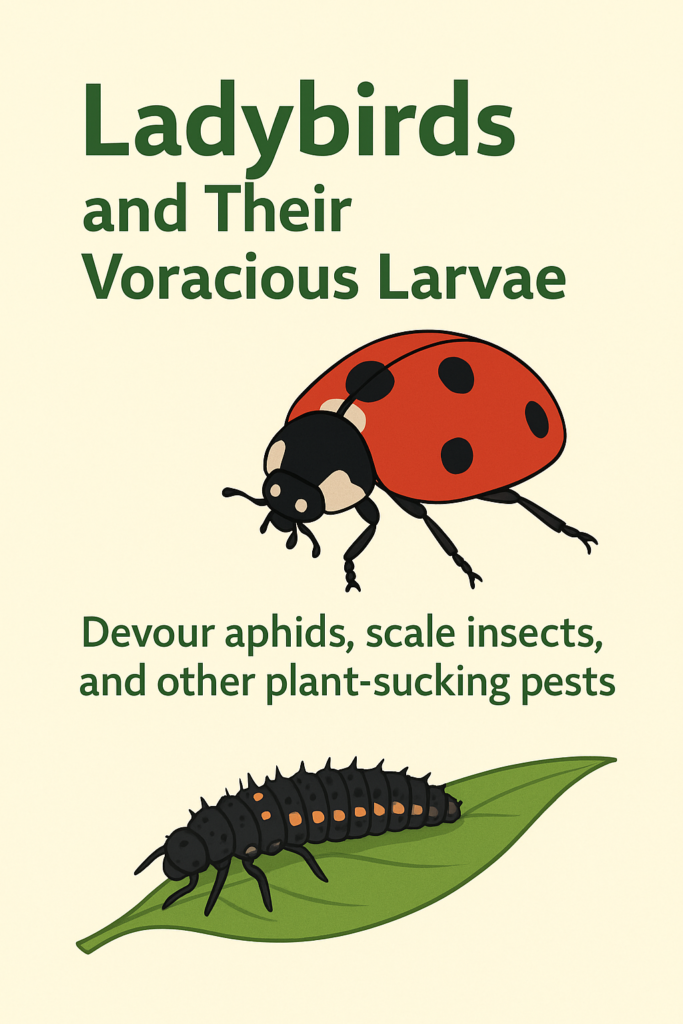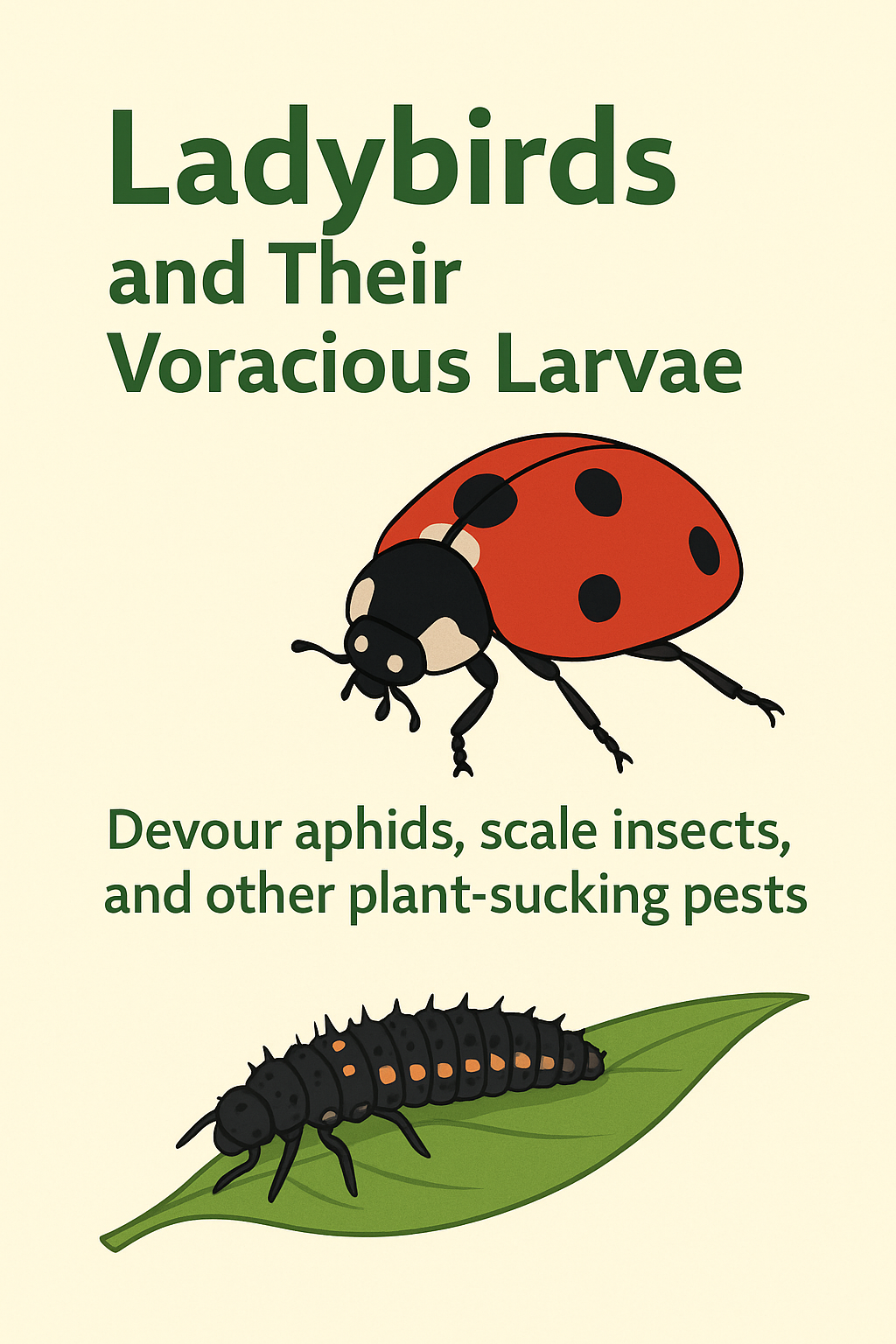
Garden Pests That Are Good for Your Plants
Local focus: Natural pest control tips for gardeners in Didcot and Wallingford.
1. Introduction – Why Not All Pests Are the Enemy
Many gardeners hear the word “pest” and think of chewed lettuces, distorted rose buds, or noisy picnics. In Didcot, summer brings slugs, aphids, and the occasional wasp near the barbecue. The same happens in nearby Wallingford. Yet not every insect causes harm. Some species protect your plants, control outbreaks, and keep the garden in balance.
Identify these allies and give them room to work. You then reduce chemical inputs, support biodiversity, and enjoy a healthier garden. This guide highlights the main helpers and explains how you can attract them. 🌿
2. Beneficial Garden Pests: Secret Helpers in Your Didcot (and Wallingford) Garden
Ladybirds: Beneficial Garden Pests That Devour Aphids
Ladybirds rank among the most effective natural enemies of sap-sucking insects. Adults eat aphids, scale insects, and mealybugs. Their larvae eat even more. The larvae look like tiny black-and-orange alligators, so many gardeners panic at first glance. Keep them safe and they repay you with clean, vigorous growth on roses, beans, and soft fruit.
Attract ladybirds with mixed borders, pollen sources, and low disturbance. Avoid broad-spectrum sprays. A small patch of nettles or yarrow supports their life cycle and keeps the food chain stable.
Ground Beetles: The Night-Shift Pest Patrol
Ground beetles patrol after dusk and hunt slugs, cutworms, and caterpillars. You rarely see them at work because they hide under stones, edging, and mulch during the day. Build simple refuges around beds and you strengthen this free patrol. A balanced mulch layer also protects soil moisture and supports beetle prey, which keeps the patrol active.
Hoverflies: Natural Pest-Control Allies
Hoverflies look like wasps but do not sting. Adults pollinate flowers and help fruit set. Their larvae control aphids with speed and accuracy. If you spot small, pale, maggot-like creatures on stems near aphid clusters, you likely found hoverfly larvae. Let them feed. Their work reduces outbreaks before damage spreads.
Grow nectar-rich umbels such as fennel, cow parsley, and dill. Succession plant these species and you keep adults in the garden from spring through autumn.
Wasps: Misunderstood Predators Working for You
Wasps cause concern in late summer when they search for sugar. Earlier in the season, they hunt caterpillars, flies, and other insects for their young. A discreet nest at the far end of the garden offers strong biological control. Place seating and play areas well away from the nest. If a nest forms near doors, paths, or high-traffic spots, seek professional advice.
Need safe, local support? See our service pages for Didcot or Wallingford.
Centipedes: Underground Pest Controllers for Healthy Soil
Centipedes live in the top layer of soil and hunt root maggots, springtails, and small larvae. They look fierce but they do not harm plants. Keep the soil covered with organic matter and you give centipedes a stable microclimate. They then help protect roots and improve overall soil health.
3. How to Encourage Your Garden’s Good “Pests”
- Plant for pollen and nectar. Choose a varied mix: daisies, herbs, native hedgerow species, and long-flowering perennials. Stagger bloom times from March to October.
- Skip broad-spectrum insecticides. These products remove allies and pests alike. Target hotspots with manual removal or spot treatments if needed.
- Create habitat. Add log piles, rock borders, bug hotels, and undisturbed leaf litter. Leave a couple of wild corners for overwintering insects.
- Mulch smartly. Apply a tidy mulch layer to retain moisture and provide daytime cover for ground predators.
- Water in the morning. Evening watering encourages slugs. Morning watering supports plants while keeping foliage dry overnight.
- Rotate crops and mix species. Diverse planting breaks pest cycles and supports a wider range of beneficial insects.
4. Common Mistakes Gardeners Make
- Squashing first, identifying later. Many beneficial larvae look unusual. Check before you act.
- Overusing chemicals. Routine spraying disrupts natural checks and allows secondary pests to surge.
- Removing every scrap of “mess”. Over-tidying strips cover and food sources. Aim for neat edges and lively centres.
- Ignoring location. Paths, play areas, and doors need clear space. Move attractants away from busy zones and reduce conflict with wasps and other wildlife.
5. Final Thoughts – Living in Balance with Nature
Your garden functions as an ecosystem, not a battlefield. When you support allies such as ladybirds, ground beetles, hoverflies, wasps, and centipedes, you lower pest pressure and improve resilience. Start small. Add habitat, grow diverse flowers, and reduce blanket treatments. Nature then does more of the work for you. 🌱
For tailored advice or safe support with nests, stings, or persistent outbreaks, speak to the local team at Shire Pest Solutions – Didcot or Shire Pest Solutions – Wallingford.




